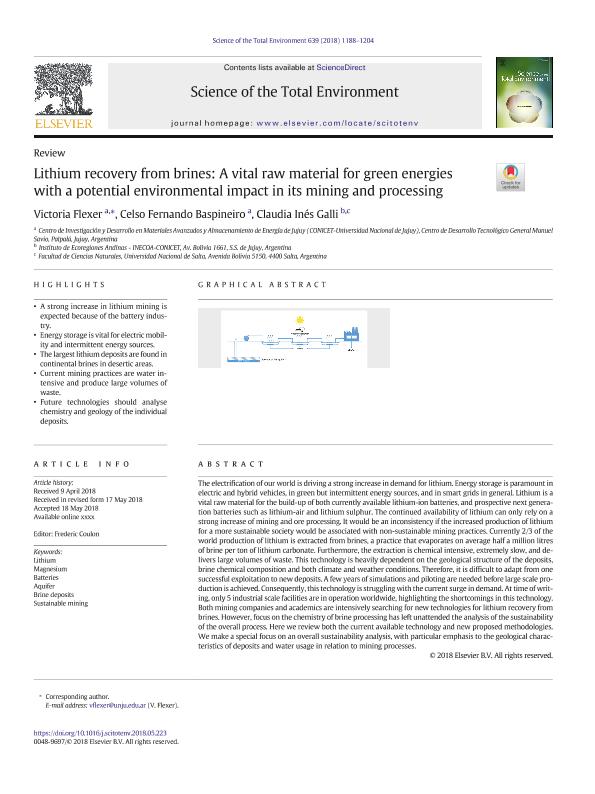Mostrar el registro sencillo del ítem
dc.contributor.author
Flexer, Victoria

dc.contributor.author
Baspineiro, Celso Fernando

dc.contributor.author
Galli, Claudia Inés

dc.date.available
2019-11-29T20:59:15Z
dc.date.issued
2018-10
dc.identifier.citation
Flexer, Victoria; Baspineiro, Celso Fernando; Galli, Claudia Inés; Lithium recovery from brines: A vital raw material for green energies with a potential environmental impact in its mining and processing; Elsevier; Science of the Total Environment; 639; 10-2018; 1188-1204
dc.identifier.issn
0048-9697
dc.identifier.uri
http://hdl.handle.net/11336/91034
dc.description.abstract
The electrification of our world is driving a strong increase in demand for lithium. Energy storage is paramount in electric and hybrid vehicles, in green but intermittent energy sources, and in smart grids in general. Lithium is a vital raw material for the build-up of both currently available lithium-ion batteries, and prospective next generation batteries such as lithium-air and lithium sulphur. The continued availability of lithium can only rely on a strong increase of mining and ore processing. It would be an inconsistency if the increased production of lithium for a more sustainable society would be associated with non-sustainable mining practices. Currently 2/3 of the world production of lithium is extracted from brines, a practice that evaporates on average half a million litres of brine per ton of lithium carbonate. Furthermore, the extraction is chemical intensive, extremely slow, and delivers large volumes of waste. This technology is heavily dependent on the geological structure of the deposits, brine chemical composition and both climate and weather conditions. Therefore, it is difficult to adapt from one successful exploitation to new deposits. A few years of simulations and piloting are needed before large scale production is achieved. Consequently, this technology is struggling with the current surge in demand. At time of writing, only 5 industrial scale facilities are in operation worldwide, highlighting the shortcomings in this technology. Both mining companies and academics are intensively searching for new technologies for lithium recovery from brines. However, focus on the chemistry of brine processing has left unattended the analysis of the sustainability of the overall process. Here we review both the current available technology and new proposed methodologies. We make a special focus on an overall sustainability analysis, with particular emphasis to the geological characteristics of deposits and water usage in relation to mining processes.
dc.format
application/pdf
dc.language.iso
eng
dc.publisher
Elsevier

dc.rights
info:eu-repo/semantics/openAccess
dc.rights.uri
https://creativecommons.org/licenses/by-nc-sa/2.5/ar/
dc.subject
AQUIFER
dc.subject
BATTERIES
dc.subject
BRINE DEPOSITS
dc.subject
LITHIUM
dc.subject
MAGNESIUM
dc.subject
SUSTAINABLE MINING
dc.subject.classification
Otras Ciencias Químicas

dc.subject.classification
Ciencias Químicas

dc.subject.classification
CIENCIAS NATURALES Y EXACTAS

dc.title
Lithium recovery from brines: A vital raw material for green energies with a potential environmental impact in its mining and processing
dc.type
info:eu-repo/semantics/article
dc.type
info:ar-repo/semantics/artículo
dc.type
info:eu-repo/semantics/publishedVersion
dc.date.updated
2019-10-17T16:30:26Z
dc.journal.volume
639
dc.journal.pagination
1188-1204
dc.journal.pais
Países Bajos

dc.journal.ciudad
Amsterdam
dc.description.fil
Fil: Flexer, Victoria. Consejo Nacional de Investigaciones Científicas y Técnicas. Centro Científico Tecnológico Conicet - Salta; Argentina. Centro de Investigación y Desarrollo en Materiales Avanzados y Almacenamiento de Energía de Jujuy; Argentina
dc.description.fil
Fil: Baspineiro, Celso Fernando. Consejo Nacional de Investigaciones Científicas y Técnicas. Centro Científico Tecnológico Conicet - Salta; Argentina. Centro de Investigación y Desarrollo en Materiales Avanzados y Almacenamiento de Energía de Jujuy; Argentina
dc.description.fil
Fil: Galli, Claudia Inés. Universidad Nacional de Jujuy. Instituto de Ecorregiones Andinas. Consejo Nacional de Investigaciones Científicas y Técnicas. Centro Científico Tecnológico Conicet - Salta. Instituto de Ecorregiones Andinas; Argentina. Universidad Nacional de Salta. Facultad de Ciencias Naturales; Argentina
dc.journal.title
Science of the Total Environment

dc.relation.alternativeid
info:eu-repo/semantics/altIdentifier/url/https://www.sciencedirect.com/science/article/pii/S0048969718318746
dc.relation.alternativeid
info:eu-repo/semantics/altIdentifier/doi/https://doi.org/10.1016/j.scitotenv.2018.05.223
Archivos asociados
